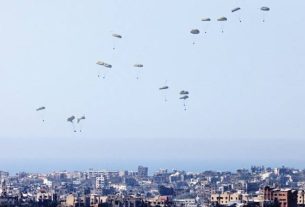The US faces repercussions for supporting Israel, including the opportunity for its rivals China and Russia to align with Australia, Canada, and Japan
Israel had the world’s sympathy on October 7, 2023. When its prime minister promised to unleash “mighty vengeance,” people thought that he would exercise Israel’s right of self-defense by going after Hamas with his special operation forces.
What came instead was a massive and indiscriminate campaign of bombing the 2.3 million residents of Gaza, followed by a ground invasion with infantry, artillery and tanks. The US intelligence has revealed that half of the bombs dropped on Gaza were just dropped randomly.
The Israeli attack was preceded by a horrific siege of Gaza, in which the basic necessities of life, water, food, energy and medicines, were cut off. Seventy five days on, some 20,000 Palestinians have been killed, with more than half being women and children. Approximately 50,000 have been injured. Half of the buildings have been destroyed, the same percentage as Dresden’s in WWII. Internet service is cut off at will. More than 1.9 million Palestinians are homeless, living in makeshift tents, drinking polluted water and subsisting on a meal a day. They live in dread as to what tomorrow will bring.
What was supposed to be a war against Hamas has turned into a war to annihilate Palestinians in Gaza and make it unlivable. According to Professor John Mearsheimer, Israel is carrying out ethnic cleansing.
After the US vetoed a Security Council resolution calling for a ceasefire, the UN Secretary General called an emergency session of the General Assembly. On December 12, it voted on a resolution calling for an immediate humanitarian ceasefire. At the start of the session, Assembly President Dennis Francis underscored the urgency of ending the suffering of innocent civilians in Gaza. “We have one singular priority – only one – to save lives.” The resolution demanded a cessation of hostilities and “the immediate and unconditional release of all hostages as well as “ensuring humanitarian access.”
The resolution also reiterated the General Assembly’s demand that all parties comply with their obligations under international law, including international humanitarian law, “notably with regard to the protection of civilians.”
The UN General Assembly approved it by an overwhelming margin: 153 to 10, with 23 abstaining.
The deck is even more skewed against Israel when considering the populations of these countries, with only 5 percent voting ‘No’ and 4.4 percent ‘Abstaining’.
Within the ten countries that voted ‘No’, more than 80 percent of the population comes from the US, Israel’s only significant ally.
Within the 23 countries that abstained, 70 percent of the population is dominated by Germany, UK, Italy, Argentina and Ukraine.
The resolution passed with more votes than a similar UNGA resolution on October 27, for which 120 countries voted in favour of a “humanitarian” truce, while 14 voted against and 45 abstained. Notably, some of America’s closest allies – Australia, Canada, and Japan –which had abstained in October, have now voted for a ceasefire.
John Whitbeck says that only two European countries voted against the resolution, indicating “that the unconditional support for Israel’s ‘right to defend itself’ manifested in Europe until recently is starting to melt away. Indeed, even Ukraine abstained.” France joined Spain and several European countries in calling for a ceasefire as did Canada, Australia and New Zealand.
Whitbeck adds that no Asian country besides Israel voted ‘No’ or ‘Abstained’, “which suggests that the US government’s hopes of enlisting loyal Asian support for confronting, containing and countering its perceived primary adversary, China, will not be easily achieved.”
When it comes to US-Israel relations, the aid recipient calls the shots, not the aid donor. In the vast literature on international relations, one would be hard-pressed to find another instance of what can best be called “donor capture”
On Sunday, December 17, France’s foreign minister called for an “immediate truce”, while the foreign ministers of the UK and Germany called for a “sustainable ceasefire.” A former defense minister of the UK said Netanyahu’s tactics would “fuel the conflict for another 50 years”. A conservative MP stated: “Bombs don’t obliterate an ideology, and neither can a stable state be constructed from oblivion.”
International pressure has made Netanyahu even more intransigent: “We’re continuing until the end, until victory, until Hamas is annihilated,” and added, “Nothing will stop us.” Netanyahu reiterated that he was not going to pursue the two-state solution: “I will not allow that we put [in power] in Gaza people who teach terrorism, support terrorism and finance it. Gaza will be neither Hamastan nor Fatahstan.”
Not to be outdone, Israeli President Isaac Herzog, a former leader of the Labor Party, told Jake Sullivan, Joe Biden’s emissary, that this was not the time to discuss the two-state solution. Earlier, Israel’s ambassador to the UK dismissed the concept of a two-state solution, saying the Oslo Accords of 1993, which Netanyahu had opposed from the very beginning, “had led to the rise of Palestinian terrorism”.
Biden reached out to Netanyahu to urge him to minimise civilian casualties but was rebuffed: “You carpet-bombed Germany, you dropped the atom bomb, a lot of civilians died.”
Biden replied: “Yeah, that’s why all these institutions were set up after World War Two to see to it that it didn’t happen again,” and cautioned Netanyahu, “Don’t make the same mistakes we made in 9/11. There’s no reason why we had to be in a war in Afghanistan.” That was the ultimate mea culpa!
The US has no leverage over Israel, despite supporting it in every international forum and providing it with $70 billion of military aid between 2000 and 2020. It has received a third of all the military aid the US has donated during this period across the globe. When it comes to US-Israel relations, the aid recipient calls the shots, not the aid donor. In the vast literature on international relations, one would be hard-pressed to find another instance of what can best be called “donor capture.” To understand how that came about, check out ‘The Israeli Lobby And US Foreign Policy’ by John Mearsheimer and Stephen M. Walt.
The US stands isolated on the world stage, giving its archrivals, China and Russia, a chance to join hands with Australia, Canada, and Japan. That’s the price it’s paying for blindly supporting a nation that practices apartheid within its borders and ethnic cleansing outside its borders. __The Friday Times





